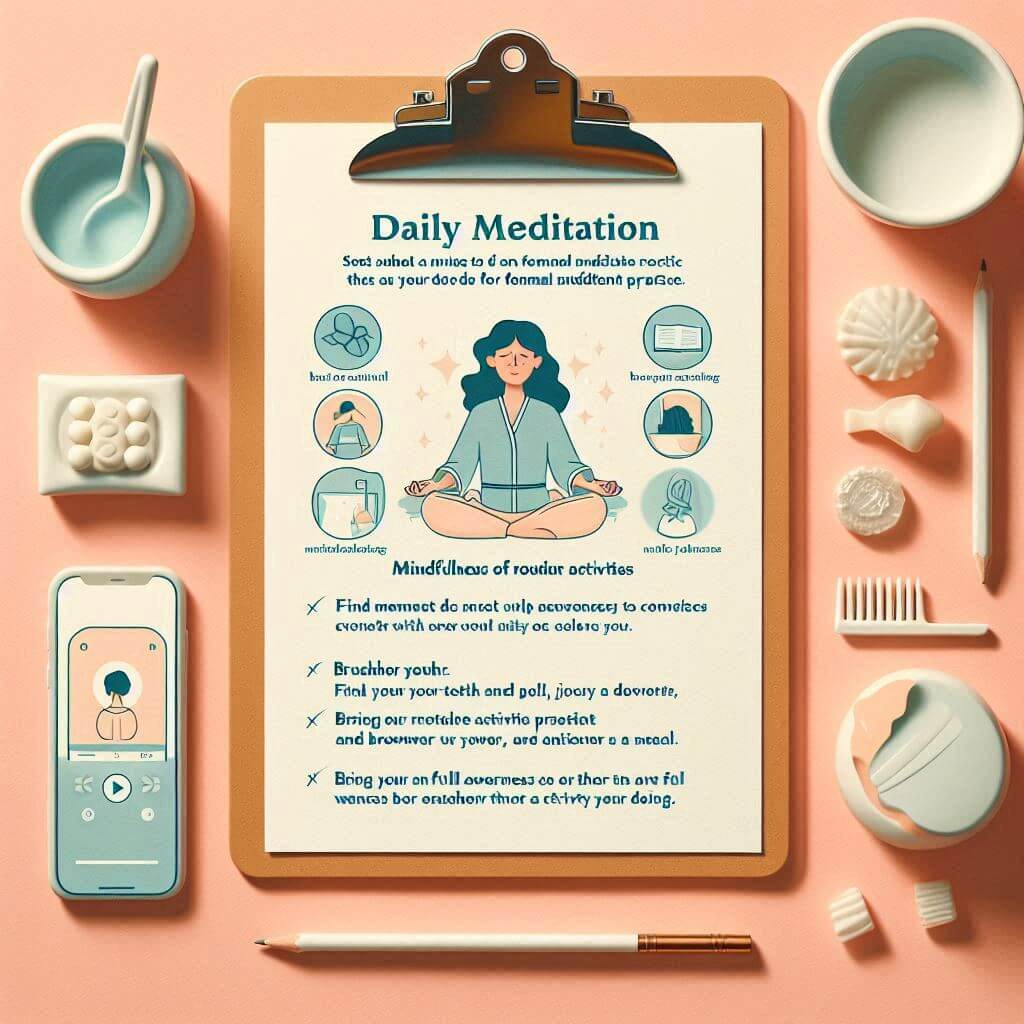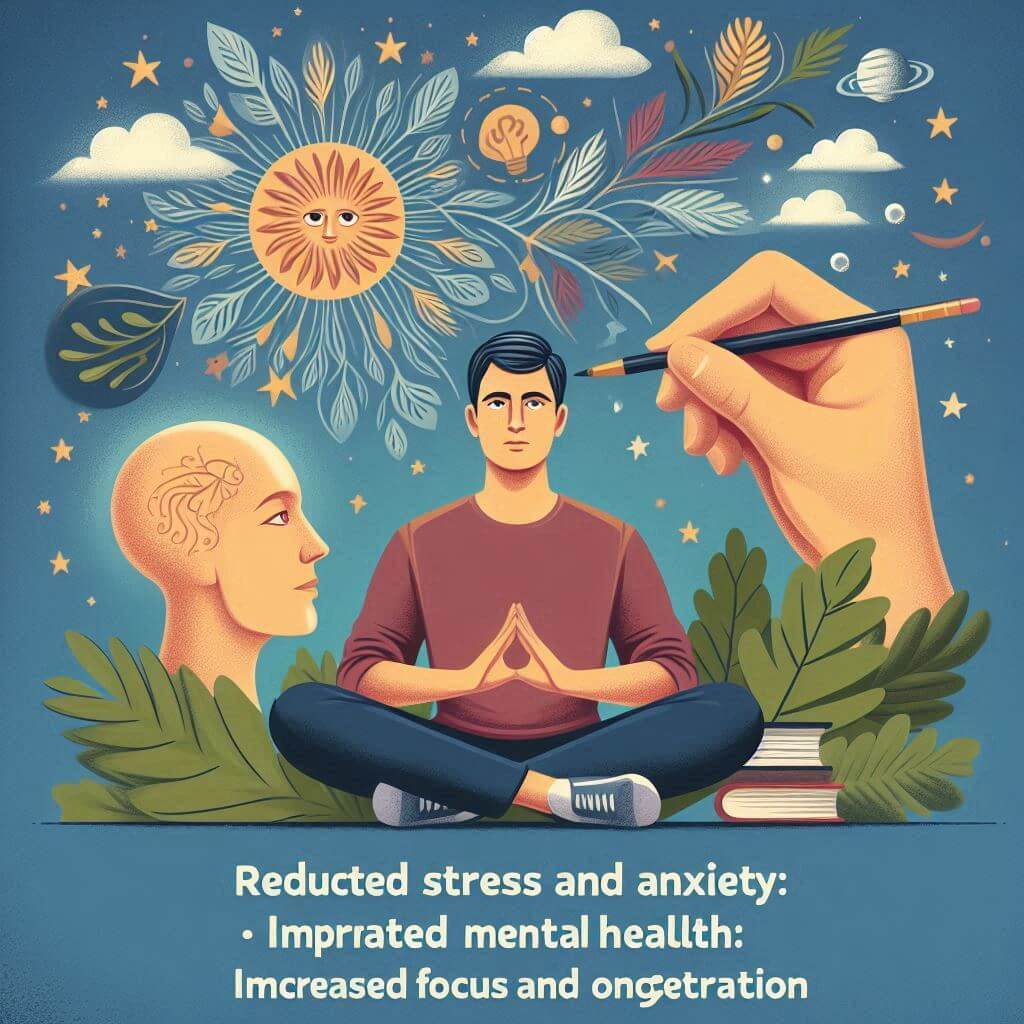Amidst the frenetic pace of modern life, the mindfulness, or mindfulness, emerges as an oasis of peace and clarity for the mind and body.
More than just a passing trend, this ancient practice is consolidating itself as a powerful tool for holistic well-being, supported by a growing body of scientific research.
Uncovering the Essence of Mindfulness:
Mindfulness translates into ability to focus on the present moment intentionally and non-judgmentally.
Imagine having an internal “lighthouse” that illuminates the here and now, allowing us to observe the thoughts and feelings that arise without getting carried away by them.
This practice invites us to experience life with greater clarity, acceptance and compassion.
An Ally for Mental Health:
Mindfulness proves to be a powerful ally for mental health, providing several proven benefits:
- Combating stress: Say goodbye to chronic stress! Regularly practicing mindfulness calms the mind, reduces anxiety and promotes a deep sense of relaxation. Imagine being able to enjoy each day with more ease and tranquility, as if you were in a peaceful refuge amidst the hustle and bustle of the city.
Example: Imagine coming home after a long, challenging day at work. Instead of drowning in negative thoughts and worries about the future, you sit in a quiet place, close your eyes, and focus on your breathing.
With each breath you take, you feel your body relaxing, your mind calming, and tension easing. This is the transformative power of mindfulness in combating stress.
- Managing Anxiety and Depression: If you struggle with anxiety or depression, mindfulness can be a beacon of hope. By cultivating emotional regulation and resilience, this practice can help you treat these conditions, leading to a more balanced and fulfilling life. Imagine dealing with intrusive thoughts and challenging emotions in a calmer, more compassionate way, without feeling overwhelmed by them.
Example: You are going through a difficult period, marked by negative thoughts and feelings of sadness.
Through the practice of mindfulness, you learn to observe these thoughts and feelings without judgment, recognizing them as passing events of the mind.
Over time, you develop the ability to distance yourself from these thoughts and emotions, cultivating a more positive and resilient outlook on life's challenges.
- Increased focus and concentration: Put an end to your wandering mind! Mindfulness sharpens your focus, attention and cognitive function, optimizing your productivity in studies, at work and in all areas of life. Imagine having the mental clarity to perform complex tasks more efficiently and achieve your goals with mastery.
Example: You're studying for an important exam and feel like your mind is constantly wandering.
Through the practice of exercises With mindfulness, you learn to train your attention, concentrating on the study material with more discipline and focus.
As a result, you retain information better, improve your performance, and increase your chances of exam success.
- Strengthening emotional resilience: Develop the ability to deal with life’s challenges in a more calm and mature way. Mindfulness teaches you to navigate the waves of emotions with wisdom, cultivating balance and composure even in the face of adversity. Imagine having the inner strength to overcome obstacles, learn from mistakes and adapt to changes with greater serenity and flexibility.
Example: You are going through a difficult time in your love relationship.
Through the practice of mindfulness, you learn to observe your feelings with compassion, without giving in to impulsive reactions or negative judgments.
This inner clarity allows you to communicate with more empathy and assertiveness, seeking constructive solutions to relationship challenges.

A Healthy Body, A Healthy Mind:
The benefits of mindfulness extend beyond the mind, positively impacting the physical health:
- Lowering blood pressure: Goodbye, hypertension! Mindfulness helps regulate blood pressure, protecting your heart and promoting cardiovascular health. Imagine having more energy for physical activities and enjoying life to the fullest, without worrying about the risks of hypertension.
Example: You see your doctor and are diagnosed with high blood pressure.
In addition to following medical advice, you decide to incorporate mindfulness into your routine.
Through practices such as meditation and deep breathing, you learn to deal with stress in a more balanced way, which contributes to reducing blood pressure.
- Strengthening the immune system: Mindfulness can be an ally in the fight against disease. Studies suggest that regular practice strengthens the immune system, making your body more resistant to infections and illnesses. Imagine having a stronger immune system, capable of fighting viruses, bacteria and other harmful agents more effectively.
- Improved sleep quality: Say goodbye to sleepless nights! Mindfulness is a powerful natural remedy for insomnia. By cultivating relaxation and quieting your mind, you can enjoy deeper, more restful sleep, waking up refreshed and ready to take on a new day. Imagine waking up in the morning feeling rested, full of energy and ready to make the most of the opportunities that life has to offer.
- Weight control and eating habits: Mindfulness can be an important tool for those looking to lose weight or maintain a healthy weight. By increasing your body and emotional awareness, you learn to make healthier and more intuitive food choices. Imagine savoring each meal with full attention, identifying the sensations of hunger and fullness and avoiding cravings. food impulsive.

Incorporating Mindfulness into your daily life:
Cultivating mindfulness is an ongoing journey that enriches your life with every step. Here are some tips to get you started:
- Daily meditation: Set aside a few minutes of your day for a formal meditation practice. There are several free apps and guides available to help you.
- Mindfulness in routine activities: Find moments to slow down and focus on the present experience. When you brush your teeth, take a shower, or enjoy a meal, bring your full awareness to the activity you are doing.
- Breathing breaks: Throughout the day, take short breaks to connect with your breathing. Inhale deeply and notice your abdomen expanding. Exhale slowly and feel your body relaxing.
- Body scan exercises: Practice body scanning, which consists of directing your attention to different parts of your body, observing physical sensations without judgment.
Mindfulness: A Journey to Integral Well-Being:
Mindfulness is not a magic solution, but rather a path to self-knowledge, self-compassion and integral well-being.
Be patient with yourself and celebrate every little bit of progress. Remember, the journey is just as important as the destination.
By cultivating mindfulness, you invest in your mental and physical health, reaping precious rewards for a fuller and more meaningful life.
In addition to individual practice, mindfulness can be incorporated into different contexts, such as relationships, work and education, promoting the creation of a more conscious and balanced world.

Mindfulness: A Force for Collective Well-Being
Although mindfulness brings countless benefits to the individual, its impact extends beyond the personal sphere.
By cultivating mindfulness and compassion for oneself, one naturally develops these qualities in relation to others.
This creates a ripple effect, promoting the creation of healthier relationships, more collaborative work environments and more peaceful societies.
- Strengthened Relationships: Mindfulness can be a catalyst for healthier, more fulfilling relationships. Practicing attentive listening, nonviolent communication, and empathy, skills enhanced by mindfulness, strengthens bonds and creates deeper connections with family, friends, and partners. Imagine a conversation with your partner where you can both express yourselves clearly and listen with your heart, seeking to understand the other person’s perspective.
- More Collaborative Work Environments: Mindfulness can transform the workplace. By reducing stress and improving communication, it creates a more collaborative and productive work environment. Imagine a work team where colleagues respect differences, communicate clearly, and work together to achieve common goals.
- Most Peaceful Societies: Mindfulness has the potential to contribute to building more peaceful societies. By cultivating compassion and acceptance, individuals become more aware of the impact of their actions on the collective. Imagine a world where people deal with conflicts more calmly, seeking peaceful solutions based on dialogue and mutual understanding.
Conclusion:
Mindfulness is an ongoing journey of self-discovery and transformation.
By cultivating mindfulness in the present moment, you invest in your mental and physical well-being, reaping precious rewards for a more balanced and meaningful life.
Remember, regular practice is essential to maximize the benefits of mindfulness.
Furthermore, mindfulness is not limited to the individual. It is a powerful tool for creating a more compassionate, collaborative and peaceful world.
Choose to incorporate mindfulness into your life and watch the transformation unfold positively in all areas of your existence.
Mindfulness: A Deep Dive into Personal Transformation – FAQ

What is mindfulness?
Mindfulness is the practice of paying attention to the present moment intentionally and without judgment. It’s about observing the thoughts, feelings, and sensations that arise without getting carried away by them.
What are the benefits of mindfulness?
The benefits of mindfulness are numerous and far-reaching, positively impacting mental, physical and social health:
- Reducing stress and anxiety: Mindfulness helps to calm the mind, reduce anxiety and promote a deep sense of relaxation.
- Improved mental health: Studies show that mindfulness can be effective in treating anxiety disorders and depression, promoting emotional regulation and resilience.
- Increased focus and concentration: Regularly practicing mindfulness sharpens focus, attention and cognitive function, optimizing productivity in different areas of life.
- Strengthening emotional resilience: Mindfulness teaches you to deal with life's challenges in a more serene and mature way, cultivating balance and composure even in the face of adversity.
- Lowering blood pressure: Mindfulness helps regulate blood pressure, protecting your heart and promoting cardiovascular health.
- Strengthening the immune system: Studies suggest that regular practice strengthens the immune system, making your body more resistant to infections and illnesses.
- Improved sleep quality: Mindfulness is a powerful natural remedy for insomnia. By cultivating relaxation and quieting your mind, you can enjoy deeper, more restful sleep.
- Weight control and eating habits: Mindfulness can be an important tool for those looking to lose weight or maintain a healthy weight. By increasing your body and emotional awareness, you learn to make healthier and more intuitive food choices.
How can I start practicing mindfulness?
There are many ways to incorporate mindfulness into your life. Here are some tips:
- Daily meditation: Set aside a few minutes of your day for a formal meditation practice. There are several free apps and guides available to help you.
- Mindfulness in routine activities: Find moments to slow down and focus on the present experience. When you brush your teeth, take a shower, or enjoy a meal, bring your full awareness to the activity you are doing.
- Breathing breaks: Throughout the day, take short breaks to connect with your breathing. Inhale deeply and notice your abdomen expanding. Exhale slowly and feel your body relaxing.
- Body scan exercises: Practice body scanning, which consists of directing your attention to different parts of your body, observing physical sensations without judgment.
Are there resources available to help me practice mindfulness?
Yes, there are several resources available to help you practice mindfulness, such as:
- Meditation Apps: There are several free and paid apps that offer guided meditations, breathing exercises, and other resources for practicing mindfulness.
- Books about mindfulness: A wide variety of books on mindfulness are available, offering different perspectives and approaches to the practice.
- Courses and workshops: Several in-person and online courses and workshops are offered for those who wish to deepen their knowledge of mindfulness and develop their practice.
- Support groups: Online and in-person support groups can be a great source of support and sharing experiences with other people who practice mindfulness.
Do you need to have experience in meditation to practice mindfulness?
No, you don’t need to have any prior meditation experience to practice mindfulness. The practice is accessible to everyone, regardless of their level of experience or prior knowledge. Start small and gradually increase the amount of time you spend practicing it.
Is mindfulness a religious practice?
Mindfulness is not a religious practice in and of itself. Its roots lie in Eastern traditions, but it can be adapted and practiced by people of all faiths or religious backgrounds.
Can mindfulness replace medical or psychological treatment?
Mindfulness is not a substitute for medical or psychological treatment when necessary. It is a complementary tool that can be integrated into convenient approaches.
Where can I find more information about mindfulness?
There are several websites and institutions that offer reliable information about mindfulness. Here are some examples:
Conclusion
We hope this FAQ has answered your questions about mindfulness. Remember, mindfulness is an ongoing journey of self-discovery and transformation. Be patient and allow yourself to experience the benefits of this ancient practice.
With dedication and discipline, mindfulness can be the key to unlocking a fuller, healthier, more meaningful life.









